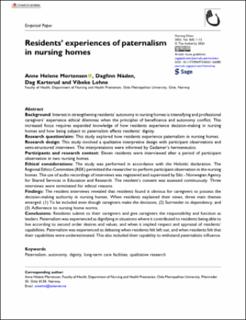| dc.contributor.author | Mortensen, Anne Helene | |
| dc.contributor.author | Nåden, Dagfinn | |
| dc.contributor.author | Karterud, Dag | |
| dc.contributor.author | Lohne, Vibeke | |
| dc.date.accessioned | 2023-08-02T07:36:42Z | |
| dc.date.available | 2023-08-02T07:36:42Z | |
| dc.date.created | 2023-08-01T10:51:22Z | |
| dc.date.issued | 2023 | |
| dc.identifier.issn | 0969-7330 | |
| dc.identifier.uri | https://hdl.handle.net/11250/3082255 | |
| dc.description.abstract | Background: Interest in strengthening residents’ autonomy in nursing homes is intensifying and professional
caregivers’ experience ethical dilemmas when the principles of beneficence and autonomy conflict. This
increased focus requires expanded knowledge of how residents experience decision-making in nursing
homes and how being subject to paternalism affects residents’ dignity.
Research question/aim: This study explored how residents experience paternalism in nursing homes.
Research design: This study involved a qualitative interpretive design with participant observations and
semi-structured interviews. The interpretations were informed by Gadamer’s hermeneutics.
Participants and research context: Eleven residents were interviewed after a period of participant
observation in two nursing homes.
Ethical considerations: The study was performed in accordance with the Helsinki declaration. The
Regional Ethics Committee (REK) permitted the researcher to perform participant observation in the nursing
homes. The use of audio recordings of interviews was registered and supervised by Sikt - Norwegian Agency
for Shared Services in Education and Research. The resident’s consent was assessed continuously. Three
interviews were terminated for ethical reasons.
Findings: The resident interviews revealed that residents found it obvious for caregivers to possess the
decision-making authority in nursing homes. When residents explained their views, three main themes
emerged: (1) To be included even though caregivers make the decisions, (2) Surrender to dependency, and
(3) Adherence to nursing home norms.
Conclusions: Residents submit to their caregivers and give caregivers the responsibility and function as
leaders. Paternalism was experienced as dignifying in situations where it contributed to residents being able to
live according to second order desires and values, and when it implied respect and appraisal of residents’
capabilities. Paternalism was experienced as debasing when residents felt left out, and when residents felt that
their capabilities were underestimated. This also included their capability to withstand paternalistic influence. | en_US |
| dc.language.iso | eng | en_US |
| dc.rights | Navngivelse 4.0 Internasjonal | * |
| dc.rights.uri | http://creativecommons.org/licenses/by/4.0/deed.no | * |
| dc.title | Residents’ experiences of paternalism in nursing homes | en_US |
| dc.type | Peer reviewed | en_US |
| dc.type | Journal article | en_US |
| dc.description.version | publishedVersion | en_US |
| cristin.ispublished | true | |
| cristin.fulltext | original | |
| cristin.qualitycode | 2 | |
| dc.identifier.doi | 10.1177/09697330231166085 | |
| dc.identifier.cristin | 2164198 | |
| dc.source.journal | Nursing Ethics | en_US |

